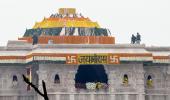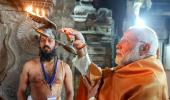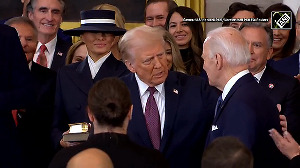Wouldn't it be better to join the celebrations with the vast Hindu majority while at the same time criticising Mr Modi/BJP/RSS for politicising it? notes Shekhar Gupta.

An apparition has stalked the Congress party for nearly four decades, in the process diminishing it from 414 seats in the Lok Sabha to 52, an improvement over 44 in 2014.
The construction of the Ram temple provided the party a Ram-given opportunity to shake it off.
The Congress leadership blew it. The apparition is the party's ideological confusion about how it defines secularism today.
Obvious questions arise following its refusal to attend the consecration ceremony of the temple.
One, does its unchanging post-1996 ideology harmonise with the needs of its current electoral politics?
How does it reconcile the contradiction of welcoming the Supreme Court judgment on the temple and yet staying out of its opening, which will be celebrated by hundreds of millions of Hindus, many of whom are its committed voters?
What will you tell your voters now, Hindus, Muslims and secularists?
The Hindus might see you as sullen losers, yo-yoing between welcoming the Supreme Court verdict and your old 'Muslim appeasement'.
The Muslims know you failed to protect the mosque, welcomed the temple verdict, and now seek their favour by not attending the inauguration.
For the hard secularists, you failed the moment you welcomed the Supreme Court's temple/mosque order. All three categories of voters might see you as hypocrites.
The party has had decades to navigate this. Its biggest failure lies in the fact that its internal debate -- if there's been any -- has been muddled.
For all these decades, the party has been waiting like the hapless pigeon sitting with its eyes shut, hoping the cat will not see it.
A pigeon waiting to be preyed upon with its eyes closed?
It's a cruel description, but unfortunately fitting for a party so complacent that even after the disaster of 2014, it did not see the threat to its existence unless it sorted out its fundamental ideological positions.
By now, it should have known that the Modi-Shah Bharatiya Janata Party had redefined the national contest around three clear issues: Culture (religion), identity (nationalism) and security.
On each of these, the Congress has looked lost, waiting for the other side to make the first move.
Nobody defeats a strong incumbent by merely being reactive, not offering an alternative vision.
This vision has to be on these three key issues we just listed. It can't be Rs 6,000 a month, free power, free this and free that.
You can't fight issues that tug at people's hearts with ideas that are purely transactional.
A voter will question how much money or freebies can equate to their faith, national pride, or family's security.
The truth is, on each of these three, the Congress's record has not been a cipher. It is just that it's unwilling to talk about it.

It was under a Congress government that the locks of the 'temple' at Ayodhya were opened so prayers could begin, and the ritual foundation laying (shilanyas) became possible.
Rajiv Gandhi launched his 1989 campaign from Ayodhya, promising to usher in Ram Rajya.
If he was over-correcting after what he saw as missteps that were viewed by Hindus as Muslim appeasement -- like the law to reverse the Shah Bano judgment and the ban on Salman Rushdie's The Satanic Verses -- it only reminds us that this ideological contradiction is a chronic one.
Both Jawaharlal Nehru and Indira Gandhi had great clarity on this in their own different ways.
Nehru was agnostic, acknowledged as such, and could navigate away from religious politics in his era while also systematically purging his party of all the stalwarts of the Hindu nationalist Right.
In contrast, Indira Gandhi wore her Hinduness around her neck, wearing a rudraksh mala.
She was never going to cede the Hindus to the Jan Sangh (the BJP's parent).
That's why she never attacked it as a 'Hindu' party. She merely called it a 'Bania' (traders') party and hailed Savarkar as 'Veer'.
She also knew she had no challenger for the Muslim vote. The confusion started after her.

One of the things really working for Mr Modi now -- as underlined during the recent assembly polls -- is the idea that he is enhancing India's global image.
The Congress did not do badly on this count under Nehru, Indira, or even Rajiv.
Why it won't talk about it is intriguing. Possibly because it doesn't want to also talk about the two non-Gandhi prime ministers who followed?
It is easy to mock Mr Modi for his almighty personality cult, the culture of sycophancy.
A voter will, however, ask what is the problem if in the process my country's stock is rising? Do you have an alternative that might work even better? Voters need alternatives, new ideas.
On national security, Mr Modi has a pretty good record, especially on its internal dimension.
There's been no significant terror attack outside Jammu and Kashmir since his rise (except the Pathankot airbase) and the definite improvement in law and order in some of the BJP-ruled states, especially Uttar Pradesh, is being rewarded by the voters.
The Congress, however, is not even willing to say how firmly -- even brutally -- its governments put down challenges to internal security.
One challenge it faces is that it would involve praising P V Narasimha Rao, who inherited the insurgencies in Kashmiri and Punjab at their peak and crushed them within 1991-1993.
This Congress does not even make enough of Rajiv Gandhi's successes in Assam, Mizoram and the near-success in Punjab through the accord with sant Harchand Singh Longowal.
Now who was he? If you are a Congress voter or well-wisher, you might wish to google. Because the party leaders won't tell you.
For reasons I have never been able to understand, the Rajiv era is marked by the forgetfulness they reserve for both Rao and Manmohan Singh.
Or they would be telling you all the time how national growth rates were higher under these governments than in the past nine years.
The Congress, therefore, is beset with several contradictions.
Who does it want to invoke from its past and who does it want to denounce?
Where does it stand on Kashmir and the issue of Article 370? Does it accept the changes or will it reverse them if elected to power?
All of these are important, but the most critical is where they stand on the temple and, by implication, Lord Ram.
Wouldn't it be better to join the celebrations with the vast Hindu majority while at the same time criticising Mr Modi/BJP/RSS for politicising it?
It wouldn't be the perfect option, but it would be enormously better than looking like that proverbial thin-skinned, fretful uncle who throws a tantrum at every wedding.
By special arrangement with The Print
Feature Presentation: Aslam Hunani/Rediff.com












 © 2025
© 2025